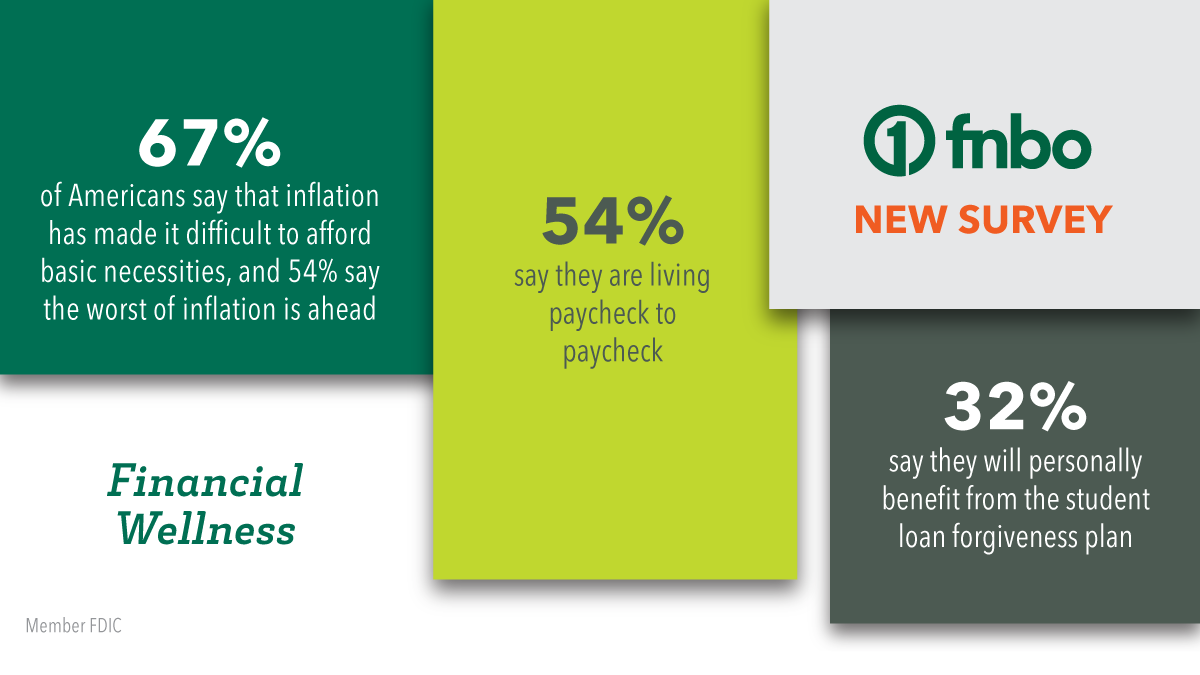-
-
-
FNBO Newsroom
Mar 16 2022
-
-

Press Release
Release Date: March 16, 2022
NEW Study: Nearly Half of Americans Have Less than $15K saved for Retirement
—2022 Financial Wellness Survey Data Released by First National Bank of Omaha—
PLUS: 40% report their top financial priority for 2022 is increasing their savings
OMAHA, Neb. March 16, 2022—First National Bank of Omaha (FNBO) today released the results of its ‘2022 Financial Wellness Survey,’ which examined financial habits and priorities of Americans, covering topics including investing, retirement and savings goals.
The survey found that while nearly half of Americans (46%) have less than $15,000 saved for retirement, one quarter say they have less than $1,000 in overall savings.
Further, 91% say they expect inflation to continue increasing throughout 2022, and 41% say they are waiting for a market correction before they invest in the stock market more aggressively.
“While it has been encouraging to see increased consumer interest in investing, saving and finances over the past two years, the numbers from our survey demonstrate the extent to which knowledge and proper guidance all play an invaluable role in helping to build a smart financial future,” said Sean Baker, executive vice president, Individual Customer Segment, FNBO. “An important first step is to develop a financial roadmap. We recommend identifying short-term versus long-term goals and seeking out a trusted financial advisor that can help pave the way to achieving those goals.”
Among the survey’s additional findings:
- Retirement: While 59% of Americans fear they won’t be able to retire by age 65, only 17% report their top financial priority for 2022 is saving for retirement. Additionally, 73% report they worry that Social Security will eventually run out.
- Financial Wellness: When asked about top financial priorities for 2022, 40% say increasing their savings and 30% say paying off debt. Compared to their situation pre-pandemic, 30% say their overall financial wellbeing is better, and 44% say it is about the same. Regarding credit, 34% say they believe their credit history holds them back from securing financial wellness.
- Nixing Subscriptions: To help boost savings, 29% of respondents say they plan on getting rid of their gym memberships, while 94% say they will be getting rid of at least one of their streaming service subscriptions this year. Respondents also identified plans to reduce spending in the following categories: eating out (64%), clothes and personal items (49%), technology upgrades (43%), travel (40%) and housing expenses (31%).
- Turning to Social Media: When asked about where they get their financial information, 47% say from personal financial websites, 34% of Americans say from financial advisors, 29% say from banking websites, 19% say YouTube, 12% say Facebook and 10% say TikTok. For those under age thirty, 30% say they get their financial information from YouTube, 25% say from TikTok and 19% say from Facebook.
This is the latest survey in the Personal Finance and Consumer Spending Survey Series from FNBO.
METHODOLOGY
This survey was conducted online using Survey Monkey among a national sample of 1,059 adults spanning across U.S. geographic regions and income levels. The survey sample was weighted to reflect the gender distribution and the age distribution across the 18-44 and 45+ age brackets in U.S. census data.
ABOUT FNBO
First National Bank of Omaha is a subsidiary of First National of Nebraska. First National of Nebraska and its affiliates have more than $26 billion in assets and nearly 5,000 employee associates. Primary banking offices are located in Nebraska, Colorado, Illinois, Iowa, Kansas, South Dakota, Texas and Wyoming. Learn more at fnbo.com and connect with us on Facebook, Twitter and Instagram.
The articles in this blog are for informational purposes only and not intended to provide specific advice or recommendations. When making decisions about your financial situation, consult a financial professional for advice. Articles are not regularly updated, and information may become outdated.